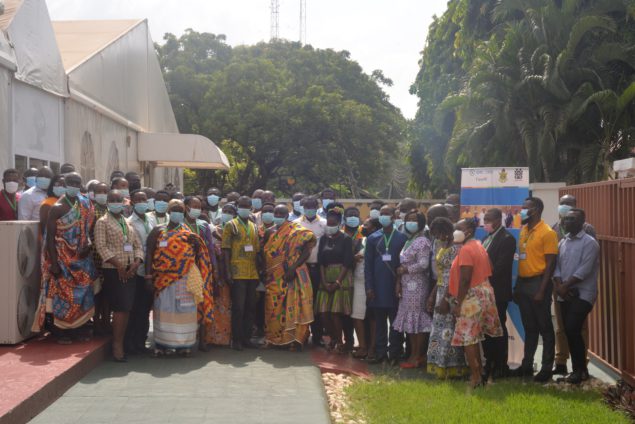A public health expert at the Kwame Nkrumah University of Science and Technology, Prof Ellis Owusu-Dabo is calling on the government to adopt a mobile phone-based IVR system to complement and strengthen existing health information system for early detection of childhood illnesses.
He believes the system has the potential to improve child survival in line with Sustainable Development Goal 3.
Prof. Owusu-Dabo said this during a stakeholder meeting in Kumasi.
The current under-five mortality rate in Ghana stands at 60 per 1000 live births.
These deaths are largely due to preventable diseases including malaria, upper respiratory infections, diarrhoeal-related diseases, prematurity, and asphyxia.
One of the principal factors for these deaths results from delays in health-seeking behaviour among caregivers. These caregivers lack the capacity to identify and pick up early symptoms of disease in their children for early intervention.
Meanwhile, a well-functioning health system with a robust Health Information System (HIS) could easily respond and deliver real-time data to manage most of these preventable childhood illnesses, amid increased mobile phone use in Ghana.
The MobChild intervention study sought to address these gaps in health-seeking behaviour by utilizing the multi-purpose function of a Mobile Phone-based Health Information system (MHIS).
This was designed with an Interactive Voice Response (IVR) technology to empower caregivers to identify health problems of their children for early intervention.
This programme was rolled out from January 2019 – December, 2021 with a team of experts from Kwame Nkrumah University of Science and Technology, Ghana Health Service and some other stakeholders from the Asante Akim North District of Ashanti Region.
The results show that a total of 2,045 calls were recorded by the system. Of the registered calls, there was an overall uptake of 66% (580/880).
Again, out of the total calls made to the system, over 1400 were unregistered-without prior registration by the system but managed to make calls for help.
All caregivers accessed the system for health advice regarding what to do with their sick children.
For diarrhoeal diseases, a 6-monthly survey revealed a decrease in the incidence from 14.9% at baseline, to 17.4% at first follow-up, 6.6% second follow-up and 4.5% at end line respectively.
While for fever, the results were correspondingly as follows; 17.2%, 16.8%, 13.7% and 29%, respectively.
Additionally, for our other principal symptom of disease-cough, the corresponding figures were 17.4%, 17.0%, 8.6% and 6.7% respectively.
The stakeholder meeting is meant to share the findings of the project.
The meeting also discussed the future of MobChild project and its implementation in the healthcare system in Ghana.
Latest Stories
-
Paris 2024: Opening ceremony showcases grandiose celebration of French culture and diversity
3 hours -
How decline of Indian vultures led to 500,000 human deaths
4 hours -
Paris 2024: Ghana rocks ‘fabulous fugu’ at olympics opening ceremony
4 hours -
Trust Hospital faces financial strain with rising debt levels – Auditor-General’s report
5 hours -
Electrochem lease: Allocate portions of land to Songor people – Resident demand
5 hours -
82 widows receive financial aid from Chayil Foundation
5 hours -
The silent struggles: Female journalists grapple with Ghana’s high cost of living
5 hours -
BoG yet to make any payment to Service Ghana Auto Group
5 hours -
‘Crushed Young’: The Multimedia Group, JL Properties surprise accident victim’s family with fully-furnished apartment
6 hours -
Asante Kotoko needs structure that would outlive any administration – Opoku Nti
6 hours -
JoyNews exposé on Customs officials demanding bribes airs on July 29
7 hours -
JoyNews Impact Maker Awardee ships first consignment of honey from Kwahu Afram Plains
8 hours -
Joint committee under fire over report on salt mining lease granted Electrochem
8 hours -
Life Lounge with Edem Knight-Tay: Don’t be beaten the third time
8 hours -
Pro-NPP group launched to help ‘Break the 8’
9 hours

